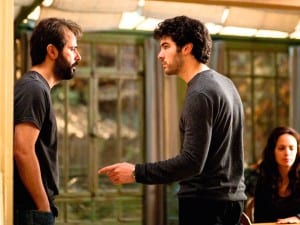The UK Film industry has taken a few major blows recently. In the face of this uncertainty, British films are being picked up by international film festivals: next stop, Tribeca.
There is an overwhelming sense of apprehension in the UK film industry at the moment. In July 2010, the Department for Culture, Media and Sport announced that the UK Film Council and all Regional Screen Agencies would be abolished and responsibilities shifted to the British Film Institute (BFI) and a new agency, Creative England with hubs in Bristol, Birmingham and Manchester. It must be noted that since 2000, the UK Film Council has invested over £160m of Lottery funding into more than 900 films, which attracted over 200 million cinema-goers and helped generate over £700 million at the box office worldwide, earning £5 for every £1 of Lottery money invested. Films like The Last King of Scotland, In the Loop, This is England, and more recently, The King’s Speech are a testament to the wide appeal of British cinema.
Since the UK Film Council was created, the box office grew by 62% (in 2009 it reached record levels of £944 million), with British films accounting for 23% of all UK cinema takings from 2001 until 2009. UK film exports exceeded £1.3 billion, 92% higher than in 2001, so it comes as no great surprise that 11 British films are premiering at this year’s Tribeca Film Festival in New York City.
Tribeca Film Festival was launched in 2001 by Robert De Niro, Jane Rosenthal and Craig Hatkoff following the attacks on the World Trade Center, to stimulate the economic and cultural revitalisation of the lower Manhattan district through an annual celebration of film, music and culture. The Festival has screened over 1,100 films from 80 countries and is well known for supporting emerging and established directors. Now in its 10th year, as a Festival, distributor, and Institute, it seems to be rivalling Sundance in its stride.
The 11 British films premiering at this year’s Tribeca Film Festival include: Gaby Dellal’s Angels Crest, Joshua Neale’s Despicable Dick and Righteous Richard, Jerry Rothwell’s Donor Unknown, Stevan Riley’s Fire In Babylon, Michael Collins’ Give Up Tomorrow, Greg Barker’s Koran By Heart, Alexandra McGuinness and Brendan Grant’s Lotus Eaters, Gemma Atwal’s Marathon Boy, Peter Mullan’s NEDS, Bill Morrison, Jóhann Jóhannsson, and David Metcalfe’s The Miners’ Hymns and Michael Winterbottom’s The Trip. These films represent the broad church that is British cinema from documentary to narrative.
This year’s Tribeca Film Festival will screen 85 feature-length films, alongside 61 shorts, and offer free online screenings. Spotlight, Cinemania and Viewpoints are three distinct areas of the Festival. Spotlight comprises of 33 films that highlight the works of a wide array of both established and rising talent, as well as recognisable subjects. This exciting mix of current global cinema consists of 16 documentaries and 17 narratives, 16 of which will world premiere at the Festival. In the Cinemania section, viewers can expect an eclectic assortment of eight narrative films that defy genre categorisation; it’s a well-rounded spectrum of contemporary genre filmmaking, including science fiction, horror, exploitation and fantasy. Viewpoints, a new addition to this year’s Festival, presents 11 narrative features and nine documentaries as a snapshot of international independent cinema that immerses audiences in distinctive perspectives.
A number of British films have enjoyed success in the USA, but contending with Hollywood has given British cinema a distinct reputation, aesthetic and overall feel. The narratives are more complex; with smaller budgets, it’s the story that takes precedence, not high octane special effects. With the current state of the film industry, it’s of paramount importance that British films continue to appear on the international festival circuit.
Senior Programmer Genna Terranova, discusses what’s on offer at Tribeca this year and how British cinema is playing a part in this year’s Festival.
What can attendees expect this year as Tribeca celebrates its 10th anniversary? How is it different from previous years?
The 10th year of Tribeca kicks off with a fantastic outdoor public screening of The Union, a documentary film by Cameron Crowe about Elton John and the making of his new album. This is a change as we usually do our premieres indoors and this year’s event is free. The Festival is on a par with the last few years – 85 films with documentaries, foreign films and narratives from around the world. However, this year we have combined some sections and streamlined the presentation of the films. We now have an expanded Spotlight section and a new section called Viewpoints.
With regards to the Festival’s mission, how does Tribeca differ from other American film festivals; what makes it unique?
Tribeca is an American festival, but also an international one. With a home in the melting pot of NYC, we serve a diverse and sophisticated audience. You can find popular films, personal films, documentaries of all sorts and foreign films in a selection of just 85 or so feature films. NYC is the media capital of the world and films that play at Tribeca attract great media attention and exposure as well as industry attention.
There are 11 UK titles featuring at this year’s Festival, can you tell me more about how British cinema features at this year’s event?
Every year we visit the UK with the specific mission of finding films made in the UK that will work for Tribeca. As the number of films that are ready and available changes, so does the number of films we programme. This year was an especially good year for British films and filmmakers in which the timing was right, and the films moved and impressed us.
What do you feel are the defining features of British cinema?
British cinema is always strong from the documentary side, primarily because the filmmakers are incredibly talented, but also because of the community that surrounds it and the financial support available – it’s a field that seems to be nurtured. Also, British cinema is well known for its biting and entertaining comedies each year, like this year’s The Trip.
Over recent years, there has been an increase in British input from directors, actors and filmmakers into the American film industry; why do you feel these collaborations are so successful?
Absolutely, some of the world’s greatest cinema talents are British; from actors to cinematographers to directors – they run the gamut. Filmmaking is a huge collaboration and when diverse talents come together from different backgrounds and it works that is a great success.
For the most part, in your opinion, how are British films perceived by American audiences?
American audiences embrace British cinema across the board. The biggest example this year is The King’s Speech, but American audiences appreciate the diverse British perspective whether it is comedy or drama. Audiences in the USA also follow directing talents, like that of Peter Mullan, who did the memorable and affecting The Magdalene Sisters. At Tribeca they will have a chance to see his highly anticipated new film, NEDS.
What about the films that will feature in Spotlight, Cinemania and Viewpoints? Can you give me a brief overview of the criteria for these sections of the Festival?
The criterion for these sections is that the film must be a NYC premiere. The Viewpoints’ films are unique visions from emerging and established filmmakers from around the globe. Their stories can be personal or their styles innovative. From a comedian running for mayor in the documentary Gnarr, to the independent comedy, Maria My Love, starring indie darling, Judy Marte, these films exhibit voices and stories that are discoveries. Spotlight’s films feature recognisable names and popular subject matter. From Carol Channing to Ozzy Osbourne, they are entertaining and appeal to a broader sensibility, but are still packed with independent spirit. Cinemania is an off-the-wall selection of genre, comedy and films that are pushing the envelope to the extreme. This youthful and out-of-the-box section of the Festival represents a part of world cinema that is just plain fun with some dark and hilarious twists, and blood spatters of course!
The Tribeca Film Festival opened on 20 April 2011 and continued until 1 May 2011. www.tribecafilm.com.
Cherie Federico




